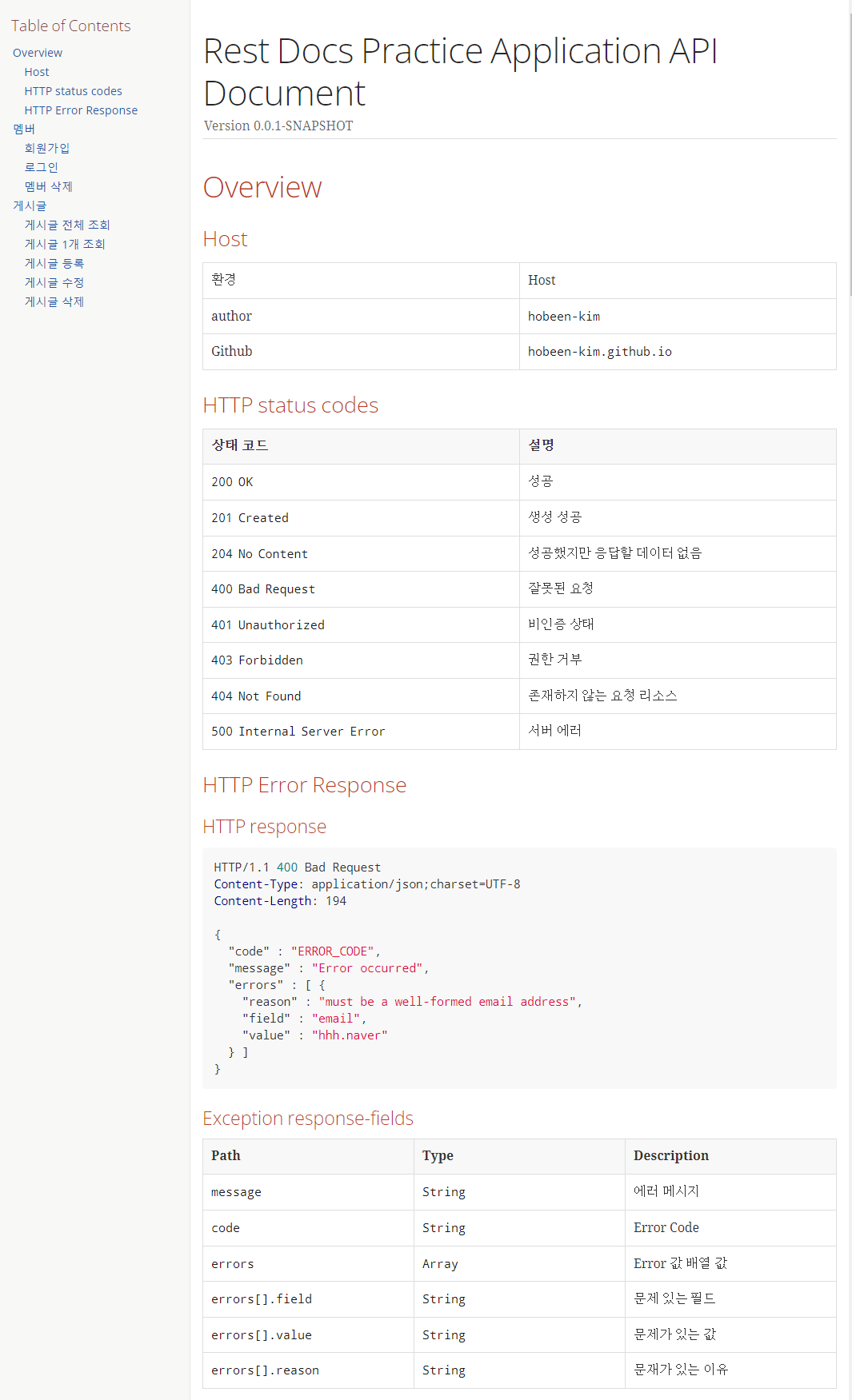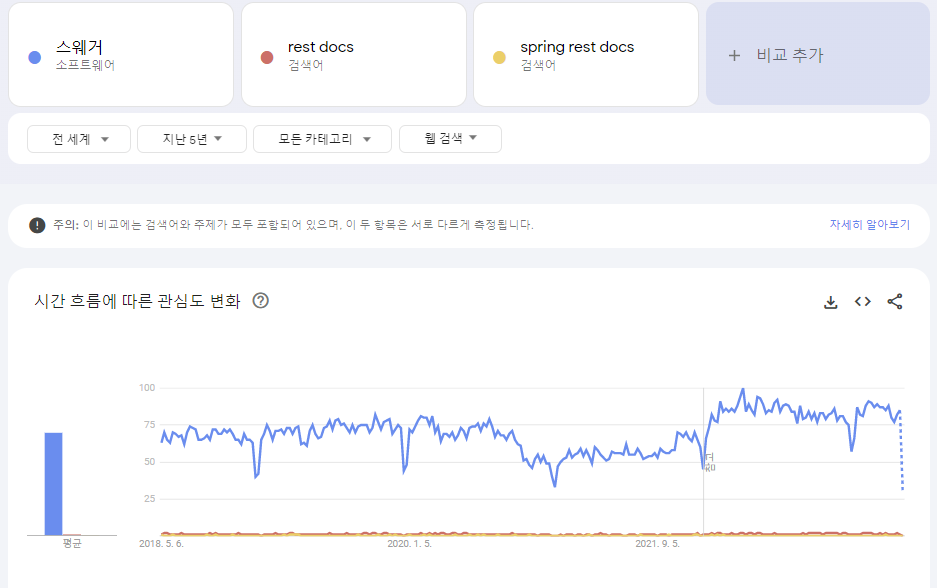- [spring] springrestdocs 를 활용한 restful api 확인
- [spring] springrestdocs 를 활용한 restful api 확인 _enum 코드 문서화
- [spring] springrestdocs 를 활용한 restful api 확인_refactoring
[spring] springrestdocs 를 활용한 restful api 확인_refactoring
Refactoring - @BeforeEach
모든 Test 에 공통적으로 적용되는 게 있습니다. 바로 아래의 @BeforeEach 코드입니다.
private MockMvc mockMvc;
@BeforeEach
public void setUp(WebApplicationContext webApplicationContext,
RestDocumentationContextProvider restDocumentation) {
this.mockMvc = MockMvcBuilders.webAppContextSetup(webApplicationContext)
.apply(documentationConfiguration(restDocumentation)
.operationPreprocessors()
.withResponseDefaults(prettyPrint())
.withRequestDefaults(prettyPrint()))
.build();
}
이 코드와 mockMvc, 그리고 각종 어노테이션까지 반복되는 설정이 중복되기 때문에 해당 설정들을 모두 RestDocsTestSupport 에 넣어주겠습니다.
RestDocsTestSupport
@Disabled
@AutoConfigureMockMvc
@ExtendWith({RestDocumentationExtension.class, SpringExtension.class})
@SpringBootTest
public class RestDocsTestSupport {
@Autowired protected ObjectMapper objectMapper;
@Autowired
protected MockMvc mockMvc;
@BeforeEach
void setUp(final WebApplicationContext webApplicationContext,
final RestDocumentationContextProvider restDocumentation) {
this.mockMvc = MockMvcBuilders.webAppContextSetup(webApplicationContext)
.apply(MockMvcRestDocumentation.documentationConfiguration(restDocumentation)
.operationPreprocessors()
.withResponseDefaults(prettyPrint())
.withRequestDefaults(prettyPrint()))
.addFilters(new CharacterEncodingFilter("UTF-8", true))
.build();
}
}
- Test 를 직접할 코드가 아니기 때문에 @Disabled 를 넣었습니다. @AutoConfigureMockMVC 는 MockMvc 를 주입받기 위해 넣었습니다. 나머지 2개는 원래 Test 코드에 있던 걸 그대로 넣었습니다.
- ObjectMapper 와 MockMvc 를 주입받아서 사용합니다.
- @BeforeEach 에서는 원래 test 코드에 있던 설정을 그대로 넣었습니다. 그리고 한글깨짐을 방지하기 위해 UTF-8 설정도 추가로 넣었습니다.
Test 코드 수정
이제 Test 코드를 수정해보겠습니다.
/*@ExtendWith({RestDocumentationExtension.class, SpringExtension.class})
@SpringBootTest*/
class MemberControllerTest extends RestDocsTestSupport {
/*private MockMvc mockMvc;
@BeforeEach
public void setUp(WebApplicationContext webApplicationContext,
RestDocumentationContextProvider restDocumentation) {
this.mockMvc = MockMvcBuilders.webAppContextSetup(webApplicationContext)
.apply(documentationConfiguration(restDocumentation)
.operationPreprocessors()
.withResponseDefaults(prettyPrint())
.withRequestDefaults(prettyPrint()))
.build();
}*/
@MockBean
private MemberService memberService;
...
RestDocsTestSupport 에서 설정한 내용은 모두 상속받는다고 생각하면 되기 때문에, 모두 삭제해줍니다. 다른 Test 들도 똑같이 삭제해줍시다.
Refactoring - @Test
이제 @Test 코드 안에 어떤 코드가 중복되는지 확인해보겠습니다.
@Test
void create() throws Exception {
final PostResponse postResponse = new PostResponse(1L, "title", "content");
when(postService.create(any())).thenReturn(postResponse);
this.mockMvc.perform(post("/posts")
.content("{\"title\": \"title\", \n\"content\": \"content\"}")
.contentType(MediaType.APPLICATION_JSON))
.andExpect(status().isCreated())
.andDo(document("post-create",
requestFields(
fieldWithPath("title").description("Post 제목").attributes(new Attributes.Attribute("constraints","길이 100 이하")),
fieldWithPath("content").description("Post 내용").optional()
)
));
}
- document 제목이 반복됩니다. [문서 내용]-[행위] 로 반복되는 패턴입니다.
- 제약조건 또한 반복됩니다. 제약 조건은 field 마다 다르지만, Entity 에서 어노테이션으로 선언된 제약조건을 그대로 가져와서 사용할 수 있을 것 같습니다.
document 공통 제목 설정
먼저 document 제목부터 설정하겠습니다. RestDocsTestSupport 의 @BeforeEach 설정에 아래와 같이 추가하고, 설정을 사용할 수 있도록 RestDocumentationResultHandler 을 주입해줍니다.
public class RestDocsTestSupport {
protected RestDocumentationResultHandler documentHandler;//RestDocumentationResultHandler 선언
@Autowired protected ObjectMapper objectMapper;
@Autowired
protected MockMvc mockMvc;
@BeforeEach
void setUp(final WebApplicationContext webApplicationContext,
final RestDocumentationContextProvider restDocumentation,
TestInfo testInfo) {
String className = testInfo.getTestClass().orElseThrow().getSimpleName().replace("ControllerTest", "");
String methodName = testInfo.getTestMethod().orElseThrow().getName();
documentHandler = document(
className + "/" + methodName
);
this.mockMvc = MockMvcBuilders.webAppContextSetup(webApplicationContext)
.apply(MockMvcRestDocumentation
.documentationConfiguration(restDocumentation)
.operationPreprocessors()
.withResponseDefaults(prettyPrint())
.withRequestDefaults(prettyPrint())
)
.alwaysDo(documentHandler)
.addFilters(new CharacterEncodingFilter("UTF-8", true))
.build();
}
- 먼저 test 클래스에서 정보를 받아와야 하기 때문에 파라미터값으로 testInfo 를 받습니다.
- ‘post-create’ 에서 post 는 class 이름인 PostControllerTest 에서 ControllerTest 를 뺀 것입니다. 따라서 replace 를 이용하여 className 을 위와 같이 설정해줍니다.
- 리팩토링 후 directory 구조는 ‘post/{test method name}’ 과 같이 만들 겁니다. 따라서 methodName 은 그대로 받습니다.
RestDocumentationResultHandler로 document 이름을className / methodName으로 설정합니다. 이렇게 설정하면 className/methodName 디렉토리 구조가 형성됩니다..alwaysDo(documentHandler)를 통해 만들어둔RestDocumentationResultHandler를 적용시킵니다.
이제 test 코드안에서 불필요한 부분을 삭제하겠습니다.
@Test
void create() throws Exception {
final PostResponse postResponse = new PostResponse(1L, "title", "content");
when(postService.create(any())).thenReturn(postResponse);
this.mockMvc.perform(post("/posts")
.content("{\"title\": \"title\", \n\"content\": \"content\"}")
.contentType(MediaType.APPLICATION_JSON))
.andExpect(status().isCreated())
.andDo(documentHandler.document(
requestFields(
fieldWithPath("title").description("Post 제목").attributes(new Attributes.Attribute("constraints","길이 100 이하")),
fieldWithPath("content").description("Post 내용").optional()
)
));
}
.andDo 에서 부모클래스에서 주입받은 documentHandler 를 사용합니다.
제약조건 설정
이제 제약조건 코드를 줄여보겠습니다. 지금은 이렇게 되어있습니다.
@Test
void create() throws Exception {
final PostResponse postResponse = new PostResponse(1L, "title", "content");
when(postService.create(any())).thenReturn(postResponse);
this.mockMvc.perform(post("/posts")
.content("{\"title\": \"title\", \n\"content\": \"content\"}")
.contentType(MediaType.APPLICATION_JSON))
.andExpect(status().isCreated())
.andDo(documentHandler.document(
requestFields(
fieldWithPath("title").description("Post 제목").attributes(new Attributes.Attribute("constraints","길이 100 이하")),
fieldWithPath("content").description("Post 내용").optional()
)
));
}
이 코드에서 .attributes(new Attributes.Attribute("constraints","길이 100 이하")) 부분은 Dto 의 제약조건으로, 해당 클래스에서 가져올 수 있습니다. (entity 에 제약조건을 설정해도 됩니다.)
먼저 제약조건을 설정하는 ConstraintFields
public class ConstraintFields<T> {
//사용할 ConstraintDescriptions 선언
private final ConstraintDescriptions constraintDescriptions;
//dto 클래스 주입
public ConstraintFields(Class<T> clazz) {
this.constraintDescriptions = new ConstraintDescriptions(clazz);
}
//fieldWithPath(path) 에 attributes 를 붙임
public FieldDescriptor withPath(String path) {
return fieldWithPath(path).attributes(
Attributes.key("constraints").value(
this.constraintDescriptions.descriptionsForProperty(path).stream()
.map(description -> "- " + description)
.collect(Collectors.joining("\n"))
)
);
}
}
ConstraintDescriptions.descriptionsForProperty(field 명).joining("\n")을 통해 제약 조건을 가져올 수 있습니다. 제약조건은 필드마다 1개 이상이 될 수 있으니 모두 가져와야 합니다.
이제 MemberControllerTest 을 다음과 같이 변경합니다.
class PostControllerTest extends RestDocsTestSupport {
@MockBean
private PostService postService;
ConstraintFields<PostRequest> fields = new ConstraintFields<>(PostRequest.class);
@Test
void create() throws Exception {
final PostResponse postResponse = new PostResponse(1L, "title", "content");
when(postService.create(any())).thenReturn(postResponse);
this.mockMvc.perform(post("/posts")
.content("{\"title\": \"title\", \n\"content\": \"content\"}")
.contentType(MediaType.APPLICATION_JSON))
.andExpect(status().isCreated())
.andDo(documentHandler.document(
requestFields(
//해당 부분 변경
fields.withPath("title").description("Post 제목"),
fieldWithPath("content").description("Post 내용").optional()
)
));
}
...
}
ConstraintFields<PostRequest> fields를 선언하고, 제약조건이 필요한 곳에 사용해줍니다. 따지기 귀찮으면 다 붙여줘도 됩니다.
제약조건이 아래와 같이 변경되었습니다.

popup 링크 동적으로 만들기
먼저 signUp 테스트 메서드를 보겠습니다.
@Test
void login() throws Exception {
final MemberResponse memberResponse = new MemberResponse("memberName", "title", "content", Authority.USER);
when(memberService.login(any())).thenReturn(memberResponse);
this.mockMvc.perform(post("/members/login")
.content("{\"memberName\": \"memberName\", \"password\": \"password\"}")
.contentType(MediaType.APPLICATION_JSON))
.andExpect(status().isOk())
.andDo(documentHandler.document(
requestFields(
fieldWithPath("memberName").description("Member memberName"),
fieldWithPath("password").description("Member password")
),
responseFields(
fieldWithPath("memberName").description("Member memberName"),
fieldWithPath("password").description("Member password"),
fieldWithPath("email").description("Member email"),
fieldWithPath("authority").description("link:common/authority.html[Enum,role=\"popup\"]")
)
));
}
여기서 .description("link:common/authority.html[Enum,role=\"popup\"]") 부분은 링크가 틀리거나 popup 이 오타가 나면 제대로 작동하지 않게 됩니다. 따라서 "" 와 같이 문자로 처리하기보다는 메서드를 만들어서 관리하겠습니다.
RestDocsTestSupport
public class RestDocsTestSupport {
...
protected static String generateLinkCode(Class<?> clazz) {
return String.format("link:common/%s.html[Enum,role=\"popup\"]", clazz.getSimpleName().toLowerCase());
}
}
Test 가 모두 상속받는 RestDocsTestSupport 클래에서 메서드를 만들어주도록 하겠습니다. generateLinkCode 는 링크를 작성하는 코드입니다. class 를 받으면 해당 클래스의 이름대로 링크를 만듭니다.
login()
responseFields(
fieldWithPath("memberName").description("Member memberName"),
fieldWithPath("password").description("Member password"),
fieldWithPath("email").description("Member email"),
fieldWithPath("authority").description(generateLinkCode(Authority.class))
)
로그인 메서드는 다음과 같이 바뀌면 됩니다.
공통 코드 문서화
CommonDocController
HTTP Error Response, HTTP status codes, Host 환경 등을 문서화해보겠습니다. 에러 관련 문서화를 위해 테스트 컨트롤러에 다음과 같이 추가합니다.
@RestController
@RequestMapping("/test")
public class CommonDocController {
@PostMapping("/error")
public void errorSample(@RequestBody @Valid SampleRequest dto) {
}
@Getter
@Setter
@AllArgsConstructor
@NoArgsConstructor
public static class SampleRequest {
@NotEmpty
private String name;
@Email
private String email;
}
...
}
GlobalExceptionHandler
그리고 ExceptionHandler 를 위해 Main 위치에 GlobalExceptionHandler 를 만듭니다.
@ControllerAdvice
public class GlobalExceptionHandler {
@ExceptionHandler(MethodArgumentNotValidException.class)
public ResponseEntity<?> handleMethodArgumentNotValidException(MethodArgumentNotValidException ex) {
Map<String, Object> errorResponse = new HashMap<>();
errorResponse.put("message", "Error occurred");
errorResponse.put("code", "ERROR_CODE");
errorResponse.put("errors", ex.getFieldErrors().stream().map(fieldError -> {
Map<String, String> errorDetail = new HashMap<>();
errorDetail.put("field", fieldError.getField());
errorDetail.put("value", fieldError.getRejectedValue().toString());
errorDetail.put("reason", fieldError.getDefaultMessage());
return errorDetail;
}).collect(Collectors.toList()));
return ResponseEntity.badRequest().body(errorResponse);
}
}
- MethodArgumentNotValidException을 받으면 message, code, errors[], error.field, error.value, error.reason 을 리턴합니다.
exception-response-fields.snippet
Exception 에는 제약 조건, optional 이 필요없으므로 exception-response-fields.snippet 을 새로 만듭니다. 위치는 test.resources.org.springframework.restdocs.templates 입니다.
|===
|Path|Type|Description
|`++`
|`++`
|
|===
CustomResponseFieldsSnippet
해당 클래스의 생성자도 추가해주겠습니다. subsectionExtractor 파라미터는 api 를 호출했을 때의 결과값에서 필드를 뽑아내는건데, errorResponse 는 그럴 필요가 없기 때문입니다.
public class CustomResponseFieldsSnippet extends AbstractFieldsSnippet {
public CustomResponseFieldsSnippet(String type, PayloadSubsectionExtractor<?> subsectionExtractor,
List<FieldDescriptor> descriptors, Map<String, Object> attributes,
boolean ignoreUndocumentedFields) {
super(type, descriptors, attributes, ignoreUndocumentedFields, subsectionExtractor);
}
//추가된 생성자
public CustomResponseFieldsSnippet(String type, List<FieldDescriptor> descriptors, Map<String, Object> attributes,
boolean ignoreUndocumentedFields) {
super(type, descriptors, attributes, ignoreUndocumentedFields);
}
@Override
protected MediaType getContentType(Operation operation) {
return operation.getResponse().getHeaders().getContentType();
}
@Override
protected byte[] getContent(Operation operation) throws IOException {
return operation.getResponse().getContent();
}
}
CommonDocControllerTest
이제 최종적으로 Test 에서 코드를 수정해주도록 하겠습니다.
class CommonDocControllerTest extends RestDocsTestSupport{
@Test
public void errorSample() throws Exception {
CommonDocController.SampleRequest sampleRequest = new CommonDocController.SampleRequest("name","hhh.naver");
ResultActions result =
mockMvc.perform(
post("/test/error")
.contentType(MediaType.APPLICATION_JSON)
.content(objectMapper.writeValueAsString(sampleRequest))
)
.andExpect(status().isBadRequest());
//FieldDescriptor 선언
FieldDescriptor[] fields = new FieldDescriptor[]{
fieldWithPath("message").description("에러 메시지"),
fieldWithPath("code").description("Error Code"),
fieldWithPath("errors").description("Error 값 배열 값"),
fieldWithPath("errors[].field").description("문제 있는 필드"),
fieldWithPath("errors[].value").description("문제가 있는 값"),
fieldWithPath("errors[].reason").description("문재가 있는 이유")
};
result.andDo(documentHandler.document(
customResponseFields("exception-response",
attributes(field("title", "Exception")), fields)
)
);
}
...
public static CustomResponseFieldsSnippet customResponseFields(
String type,
Map<String, Object> attributes, FieldDescriptor... descriptors) {
return new CustomResponseFieldsSnippet(type, Arrays.asList(descriptors), attributes, true);
}
}
customResponseFields에서 인자가 3개인 것을 볼 수 있습니다. 원래 있던customResponseFields에서 메서드 오버로딩한 것입니다.- exception-response-fields.snippet 을 만들었으니 첫번째 인자로 “exception-response” 를 줘야 합니다. 나머지는 enum 이랑 비슷하게 생각하면 됩니다.
HTTP status code, host 환경 문서화
마지막으로 제일 첫 페이지에 나올 host 환경, http satus code 설명을 넣어줍니다. src 디렉토리의 docs.asciidoc 에 overview.adoc 으로 만들어주면 됩니다.
[[overview]]
== Overview
[[overview-host]]
=== Host
|===
| 환경 | Host
| author
| `hobeen-kim`
| Github
| `hobeen-kim.github.io`
|===
[[overview-http-status-codes]]
=== HTTP status codes
|===
| 상태 코드 | 설명
| `200 OK`
| 성공
| `201 Created`
| 생성 성공
| `204 No Content`
| 성공했지만 응답할 데이터 없음
| `400 Bad Request`
| 잘못된 요청
| `401 Unauthorized`
| 비인증 상태
| `403 Forbidden`
| 권한 거부
| `404 Not Found`
| 존재하지 않는 요청 리소스
| `500 Internal Server Error`
| 서버 에러
|===
[[overview-error-response]]
=== HTTP Error Response
operation::CommonDoc/errorSample[snippets='http-response,exception-response-fields']
마지막으로 index.adoc 파일과 member.adoc, post.adoc 파일을 변경된 adoc 파일명에 맞게 수정해줍니다. 아래는 index.adoc 입니다.
= Rest Docs Practice Application API Document
:doctype: book
:source-highlighter: highlightjs
:toc: left
:toclevels: 2
:sectlinks:
:docinfo: shared-head
include::overview.adoc[]
include::member.adoc[]
include::post.adoc[]
참고로 모든 테스트를 한번에 돌리려면
./gradlew test로 돌리면 됩니다.
마치며
최종적으로 아래와 같이 잘 나왔습니다.

잘 따라오시면 어렵지 않게 간단한 restDocs 를 구현하실 수 있을 것 같습니다. 물론 저도 test 에서나 .adoc 에서 완벽하게 만들었다고 할 수 없지만요. 새로운 툴을 사용하는 건 두려우면서도 재밌습니다.
다음에는 Swagger 를 포스팅해봐야겠습니다. 아무래도 사람들이 많이 사용하는 건 Swagger 인거같거든요.

또한 Rest Docs 를 openAPI Spec 으로 변환 후 swagger UI 를 사용할 수도 있다고 합니다. github 에서 확인할 수 있습니다.
Ref.
SpringRestDocs를 SpringBoot에 적용하기
API 문서 자동화 - Spring REST Docs 팔아보겠습니다
+ 추가 : Spring REST Docs 적용 및 최적화 하기 <- 포스팅 시에는 참고하지 않았지만 이후에도 계속 rest docs 를 공부하면서 찾다보니 제일 도움되는 포스팅입니다.



댓글남기기